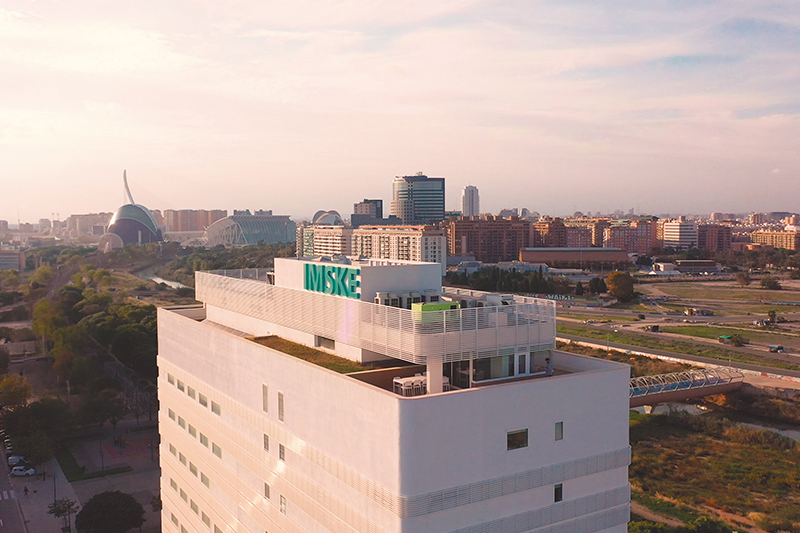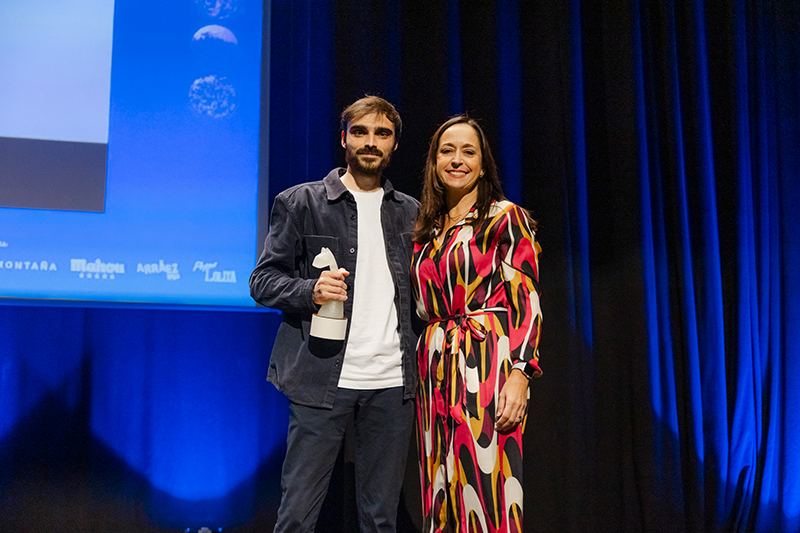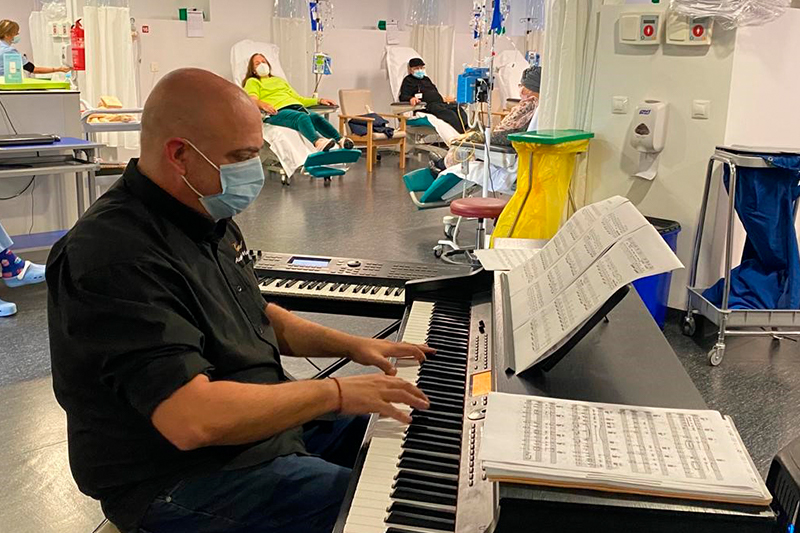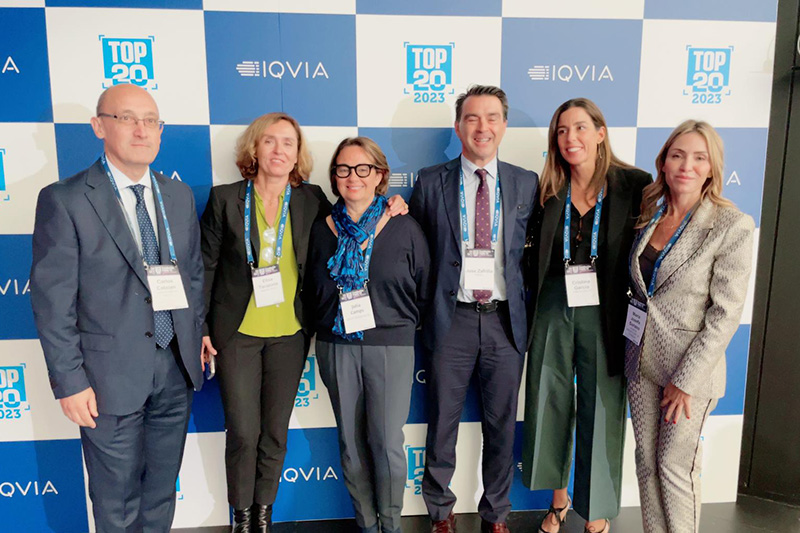
by S0p0rt3 | Feb 19, 2024 | Ribera |
- The healthcare group integrates its first hospital in Valencia, the result of an agreement with the healthcare professionals behind the initial project.
- IMSKE is a private hospital of high specialisation and international prestige, focused on the musculoskeletal system and with a wide range of related services, such as Rheumatology, Sports Medicine, Rehabilitation, Physiotherapy, Paediatric Orthopaedics, Podiatry and Neurology, among others.
The Ribera healthcare group incorporates the IMSKE hospital into its healthcare network and enters Valencia with its first hospital in the capital of the Valencian Community. Ribera has reached an agreement with the healthcare professionals behind the initial project to work together and continue developing this highly specialised and internationally renowned centre, in order to grow and bring its services closer to the citizens of the Valencian Community and other regions of Spain.
The European Musculoskeletal Institute (IMSKE) is a private hospital, located in one of Valencia’s growing neighbourhoods, very close to the Marina and the City of Arts and Sciences, specialising in the musculoskeletal system, with a wide range of related services, such as Traumatology, Rheumatology, Sports Medicine, Rehabilitation, Physiotherapy, Traumatology and Orthopaedics for children, Podiatry, Psychology and Nutrition, among others.
Musculoskeletal injuries affect around 60% of the population in Spain, according to the group’s specialists. Moreover, the ageing of the population, the increase in chronic diseases, sedentary lifestyles, poor postural hygiene, lack of information and adequate physical preparation for sports practice, together with the shortage of professionals, are some of the reasons given by the World Health Organisation for the fact that more than 400 million people in Europe do not have the necessary rehabilitation services.
The CEO of the healthcare group, Elisa Tarazona, stressed that the Mediterranean arc “is strategic for Ribera, as demonstrated by our recent investments in the Region of Murcia with the Virgen de la Caridad and Cardiosalus medical centre, in the southern area of Alicante, with the Ribera Ciudad Quesada clinic, and now in Valencia with the IMSKE hospital”. He also pointed out that “our objective is to reinforce and respect the vision of the project and the professionals involved in it, and to contribute the value of our experience in the management of public and private healthcare centres in five regions of Spain, in Portugal and in Central Europe”.
For her part, the CEO of IMSKE, Isabel Muñoz, said that “we are very excited about this new stage of IMSKE. In these three years we have set up the hospital with a team of exceptional doctors and people and now it is time to grow, with the backing of one of the best healthcare groups in Spain”.
About IMSKE
IMSKE is a pioneering hospital in Spain, specifically focused on the prevention, diagnosis and comprehensive treatment of the entire locomotor system. Founded in 2020 by doctors Isabel and Ignacio Muñoz Criado, IMSKE is a hospital centre designed by doctors and oriented towards the patient, based on a deep knowledge of musculoskeletal pathologies. It currently has more than 100 professionals from different areas, who work in permanent collaboration to attend to the patient throughout the entire medical recovery process.
But it also has among its values, research and teaching. The ongoing training of its entire team, as well as of new professionals, both national and foreign, is one of the missions that led its founders to set up this project and call it the European Musculoskeletal Institute.
IMSKE currently has one of the best care ratings both in direct patient reviews and in the satisfaction indicators of the main insurance companies.
Thanks to this extraordinary rating, the hospital has consolidated its position in Valencia in just three years, laying the foundations for an innovative, efficient and disruptive project in the field of medicine.
About Ribera
Ribera is a business group providing public and private healthcare services, which has been working for the health and well-being of the population since 1997. In Spain, it is present in 5 autonomous communities, manages 13 hospitals, 2 of which are university hospitals, and 70 health centres and polyclinics, as well as other projects in Europe and Latin America. For more than 20 years it has developed a public-private partnership model that is being studied as a success story at leading universities such as Berkeley and Harvard Business School. The group also has a University School of Nursing and a Health Professional Training Study Centre, a Futurs technology division, a Ribera Lab laboratory division, a Ribera b2b purchasing centre and a Foundation for research and health promotion, among other projects. Its responsible health model based on value-based medicine responds to its commitment to society to continue providing value and innovative solutions to address global health challenges, in line with the Sustainable Development Goals of the 2030 Agenda.

by S0p0rt3 | Feb 19, 2024 | Ribera |
- This week, the healthcare group has received such outstanding awards as a gold and a silver statuette, as well as the special jury prize at the most important creative festival in the Valencian Community for its Ritmos de Vida campaign, also awarded as best campaign by New Medical Economics.
- The president, Alberto de Rosa, and the councillor, Elisa Tarazona, also receive awards for their work on behalf of patients and families with rare diseases and for female leadership in healthcare management, and the Innovation Club recognises Ribera for the most innovative project, large company category.
In recent days, Ribera has received several awards for one of its star campaigns this year, Ritmos de Vida, focused on helping to prevent cardiovascular diseases with a creative concept that unites music and health, as well as for the health group’s management, represented in values such as humanisation and clinical leadership.
The first awards came last Friday at the Festival La Lluna, one of the most important creative competitions in Spain. The Ritmos de Vida campaign, designed by the Maart agency for the Ribera group, was awarded a Gold statuette, a Silver statuette and the jury’s special prize for the best campaign. The Advertising and Creative Communication Festival of the Valencian Community held its 12th edition on 24 November, with more than 300 entries from 28 agencies and more than 100 advertisers. The event, organised by the Association of Advertising Communication Companies, aims to highlight the value of Valencian creativity and increase the visibility of the agencies.
Just a few days later, on Tuesday 28th, the digital publication New Medical Economics recognised in its annual awards the female leadership of the CEO of the Ribera Group, Elisa Tarazona, as well as the awareness campaign for the prevention of cardiovascular diseases, Ritmos de Vida, which was awarded the prize for the Best social and health dissemination campaign.
The awards ceremony, which took place in Madrid, was attended by Ribera’s CEO, Elisa Tarazona, accompanied by the president of the health group, Alberto de Rosa, as well as Ribera’s Director of Communication, Marketing and CSR, Angélica Alarcón, who was in charge of collecting the award for the Ritmos de Vida campaign.
During her speech, Elisa Tarazona expressed her gratitude for the recognition and took the opportunity to highlight the role of women in management and middle management in any company, especially in healthcare companies. “In the Ribera Group, 70% of our professionals are women and, therefore, more than half of the middle managers are also women”, she assured.
Yesterday, the president of the Ribera healthcare group, Alberto de Rosa, received the award for healthcare company of the year from the National Institute for Rare Diseases INDEPF, which every year recognises, at a charity gala where it presents its “Rare” awards, the work and efforts of individuals, companies and institutions in favour of patients and families with rare diseases.
Yesterday, the Innovation Club also recognised Ribera in its awards for the good results of its Chronic Patient Management Programme, as the Most Innovative Project, large company category. Specifically, this programme includes innovative technology based on artificial intelligence, such as that provided by the virtual caregiver Lola, implemented by Tucuvi. The award was collected by the Innovation Director, Manuel Bosch, and by the group’s Digital Transformation Officer, Tania Menéndez.
About Rhythms of Life
Ritmos de Vida is the name given to the Ribera Group’s campaign that unites health and music to raise awareness of cardiovascular diseases and associated risk factors and which involved the construction of the first ever arrhythmic metronome, which has been the protagonist of a travelling exhibition in its hospitals and the focus of activities with patients, conferences and musical performances to link music and cardiovascular health. Today Ritmos de Vida brings together all the actions of the healthcare group related to music and health, from music therapy to prenatal music workshops, therapeutic use in units such as Intensive Care in some of its hospitals, day hospital and Mental Health, among others.

by S0p0rt3 | Feb 19, 2024 | Ribera |
- Music therapy, micro-concerts, prenatal singing, music libraries, collaborations with health musicians and a channel with song lists adapted to groups of patients are some of the actions promoted by the health group in its hospitals and which are included in the Rhythms of Life programme.
- Various specialists claim that music therapy can reduce blood pressure and heart rate and have a direct effect on stress and anxiety, as well as influencing cognitive and emotional levels.
- During 2023, the Rhythms of Life programme focused on outreach for the prevention of cardiovascular disease with the construction of the first ever arrhythmic metronome.
The Ribera healthcare group is giving new impetus to music therapy and the different actions that unite music and health in its hospitals, to improve the well-being of its patients and contribute positively to their recovery. Workshops, micro-concerts, prenatal singing, music games and a Spotify channel with different playlists are some of the activities that are now grouped together in the Ritmos de Vida group’s macro-programme.
Ritmos de Vida was born a year ago as a project to raise awareness of the importance of heart health by linking the tempo of music to the rhythm of heartbeats and building the first ever arrhythmic metronome. This campaign, carried out with the help of the creative agency Maart, has been displayed in the group’s main hospitals, which have also organised conferences and talks to help patients prevent cardiovascular risks, as well as music therapy workshops and live performances.
All the initiatives organised by Ribera that link music and health are now part of the Rhythms of Life macro-programme, and the group’s objective is to progressively incorporate all the new actions in this line. “More and more scientific studies are linking music to wellbeing and quality of life,” explains Ribera Polusa hospital psychologist Belén Vázquez, who assures us that “it is a good therapeutic tool, which is becoming increasingly important in clinical practice, affecting the physical, cognitive, emotional, social and behavioural components”.
Dr. Alex García, head of Neurology at Denia Hospital, assures that music therapy “has a controlled influence, among other things, on motor skills, memory, attention, creativity, verbalisation, strengthening of the senses, proprioception, reduction of stress and anxiety, brain stimulation, the immune system and biological rhythms”. Hence, as the Ribera Polusa psychologist recalls, it has very beneficial effects on sleep disorders, anxiety, depression, personality disorders or phobias of different types. Micro-concerts organised in areas such as dialysis, oncology day hospital or the ICU have been very well received by patients and their benefits have been demonstrated.
Christelle García, psychologist at the Vinalopó University Hospital, says that “some clinical studies show that music therapy can be used as an alternative therapy in the treatment of depression, autism, schizophrenia and dementia, as well as for problems of agitation and substance abuse, with benefits in the field of social isolation, cognitive sphere and psychotic symptoms”. He also explains that “in patients admitted to the ICU, music therapy can help them by reducing heart rate, respiratory rate and blood pressure, which facilitates a relaxation response”. In the ICU of the Hospital Universitario de Torrejón, music is “a non-pharmacological tool to improve the physical and emotional well-being of patients and their relatives”, as the supervisor of this unit, Conchi Faura, explains. “Music therapy has been shown to reduce stress and anxiety in patients, creating a positive atmosphere during their stay in a complicated space,” she adds.
In addition, music therapy and prenatal singing workshops have been introduced in the group’s hospitals to help pregnant women relax. With paediatric patients, music also has a “calming” effect. Hospitals such as the university hospitals of Vinalopó and Torrejón, Denia, Ribera Povisa, Ribera Polusa or Ribera Hospital de Molina have already demonstrated how well they are received by patients. A patient recently wrote about an experience with music therapy at Torrejón Hospital: “Both my father, who was admitted to the ICU, and we burst into tears when we heard you, and the emotion was at its peak when we saw my father moved, remembering childhood experiences thanks to your beautiful melodies and voices. Music therapy should be a compulsory treatment”.
In order to disseminate the benefits of music in the field of health to the general public, as well as to patients and professionals themselves, the Ribera Group has recently launched a Spotify channel with personalised music playlists for different groups of patients and professionals.

by S0p0rt3 | Oct 30, 2023 | Ribera |
- The directors of the Foundation and the Breast Area of the health group, Mercedes Gozalbo and Julia Camps, attend the meeting of the European project that develops a “swarm learning” to improve the accuracy of Artificial Intelligence.
- The meeting, held in Athens, allows progress to be made on a common tool that will help to anticipate the disease, improve individualised treatments and monitor its evolution more precisely, reducing uncertainty for patients.
Artificial Intelligence is not the future, it is the present. That is why the Ribera healthcare group has been part, for several months now, of the work team of the European ODELIA project, whose objective is to develop an advanced Artificial Intelligence model, including a secure exchange of data, in this case to create even more personalised predictive and follow-up models for breast cancer. This week, the project has taken a new step to advance a common tool, which will allow the exchange of valuable information without sharing patient data, with the working meeting attended by the directors of the Ribera Salud Foundation and the Breast Area, Mercedes Gozalbo and Julia Camps respectively. “The next step is for all members to start uploading images and data, to help the AI model learn,” explains the Foundation’s director.
The international prestige of the group’s Breast Area, led by Dr Camps, and the large number of patients treated in the breast units of Ribera hospitals, make Ribera a strategic partner of this European project. “ODELIA will help to improve the individualised treatment of patients and will also be a tool to help predict the disease. It will also reduce uncertainty about the evolution of breast cancer, thanks to the predictive model, as well as the response to drugs, which will allow patients’ treatment to be personalised earlier and with greater certainty,” explains Dr. Julia Camps.
The ODELIA project is a decentralised swarm machine learning solution that allows multiple collaborators to share information without sharing the patient data itself, protecting the privacy and security of the data, yet allowing all collaborators to benefit from the collective learning. Data governance and privacy are preserved.
“When organisations only have access to their own data, their AI models evolve based only on information about the people the organisation has worked with or works with, which creates a bias in the models. With swarm learning, an organisation can combine its data with learnings from other organisations, increasing accuracy and reducing bias,” explains the director of the Ribera Salud Foundation.
The next ODELIA project meeting will take place in spring.

by S0p0rt3 | Oct 24, 2023 | Ribera |
- The Torrejón and Vinalopó university hospitals and the Denia hospital, public centres managed by Ribera, receive the most prestigious recognition in healthcare for their quality and efficiency indicators.
- Denia hospital, the most awarded hospital of the health group, after comparing results among more than 200 Spanish health centres, which undergo the evaluation of an independent scientific committee.
Ribera Hospitals received a total of seven TOP20 awards at a ceremony held today in Madrid, which each year brings together the best hospitals in Spain to distinguish the health centres with the best indicators of quality and efficiency in management, as well as the number of surgical procedures without admission, the percentage of readmissions, complications and mortality rate, among others. Three of these awards are for Global Management, the most prestigious recognition of the ceremony, and have gone to the Torrejón and Vinalopó university hospitals and the Hospital de Denia, public health centres managed by the Ribera health group under concession.
This year, the university hospitals of Torrejón and Vinalopó have also achieved recognition in the TOP20 in the category of Women’s Area, as hospitals with Obstetrics and Breast and Uterine Surgery. Denia Hospital, for its part, has been recognised in these awards for its work in the Nervous and Respiratory areas, in addition to the Global Management award mentioned above. Two other hospitals in the group, Ribera Hospital de Molina and Ribera Povisa Hospital, were finalists in Traumatology and Digestive Medicine.
Last year, the three public hospitals managed by the Ribera healthcare group also won the TOP20 award for best overall management, confirming the commitment to excellence and quality in patient care at the Denia, Vinalopó and Torrejón hospitals, as well as their good management indicators, contrasted by independent entities, such as the one that coordinates the TOP20. These awards compare results among more than 200 Spanish healthcare centres, which voluntarily submit themselves to the evaluation of some thirty indicators, and a scientific committee distinguishes those centres with better performance and greater quality and efficiency of care, in aspects such as the efficient management of hospital stay and outpatient surgery, compared to the measurement of readmissions, complications and mortality, adjusted to risk.
These awards divide hospitals into different categories to facilitate comparison between centres and similar management contexts, and distinguish the performance of those hospitals with the best overall balance in the 120 indicators of the eight clinical areas reviewed. In general terms, it offers the healthcare sector a useful tool for the improvement of results, based on quality, performance and efficiency indicators, as well as recognising good practices in the sector.






Recent Comments